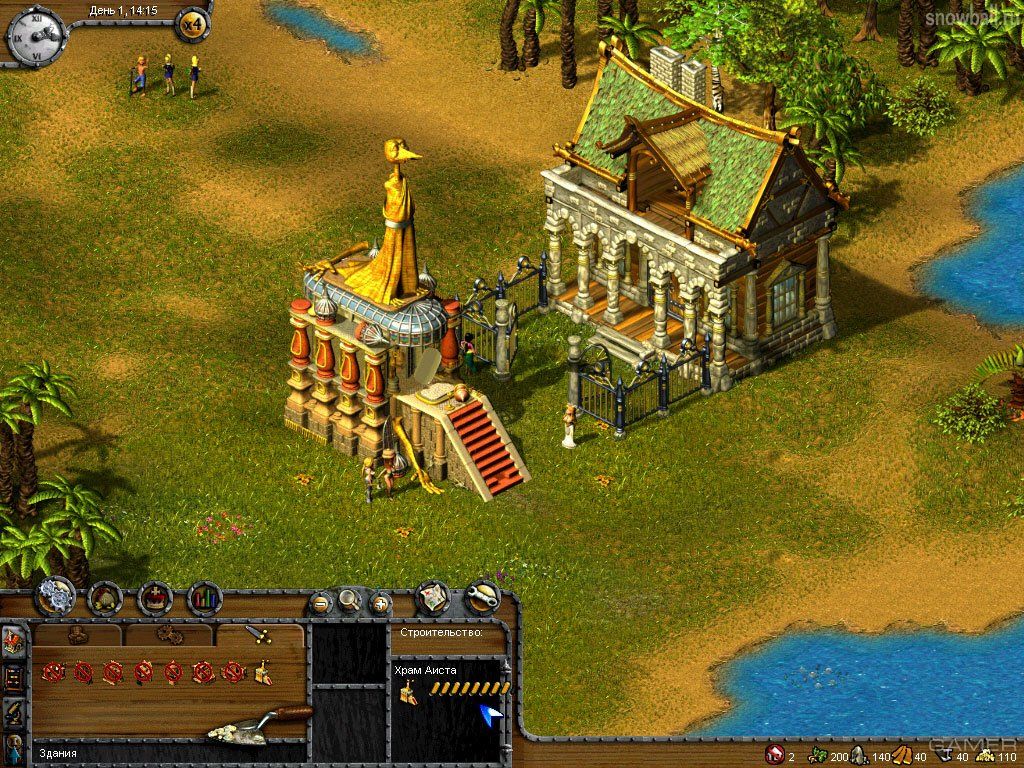Returning to The Nations
How a 2001 city-building sim flipped gender roles and raised both eyebrows and questions

Twenty-six megabytes. Twenty-two extra missions. No extra cost. I wanted to play JoWooD’s successor to Alien Nations. It was six years after The Nations’ release that I finally got my hands on the game (courtesy of my father who had just returned from a business trip). This was the time when game discs actually contained the entire game. I popped the colourful disc into my archaic PC and headed to school; the installation was completed by the time I returned home. With no pesky downloads to stop me, I dived right in.

Lukkat is home to three tribes: The Pimmons, the Amazones (creative licence) and the Sajikis. Think of the Pimmons as blue hobbits who’d choose mushroom brandy over world domination. A wise choice. Amazones, as one would expect, are a fierce, war-mongering tribe led by glamorous women who are bound by principles. Sajikis are crafty insect-like beings who don’t really care about hygiene or social distance and fulfil their psychoactive recreational needs by smoking worms.
In case you’re wondering, the worms are called cigarillos. Neat.
Each tribe has its own quirks, be it fashion, culture or architecture. This lends The Nations a dash of character that few city-building sims can claim to possess. Even the manner in which tribe members idle or go about their day is unique, built on a diverse set of philosophies and rituals. The pixelated yet artfully-rendered buildings themselves stand testament to this fact. One can easily spot the differences between an Amazone outpost itching for expansion and a Pimmon town crowded by taverns. The cutesy 2D isometric graphics, while not breathtaking, lend the 19-year-old game a sense of life and originality. Its vibrant colour palette looks fresher than ever, almost two decades from its launch. While the soundtrack is not among the more memorable ones out there, it keeps you grounded in a world where insects get hangovers and blue hobbits suffer from obesity.
The Pimmons fill their potbellies at said taverns with a tenacity none can match, while the Amazones go about their lives with an air of sophistication. While one may find the Sajikis odd at first, their six-legged guile and charm will win you over. An adorable little she-bug playing with a jump rope is something I could watch all day. Beats a blonde Amazone teen (redundant since they’re all blonde) on a scooter any day of the Pimmon week. Sights like these keep your trigger finger away from the fast-forward option, one that normally lets you speed things up by a maximum of four times.
But alas, there are resources to gather, cities to build and prophecies to fulfil.
Another Prophecy

In a game glistening with colour and bizarre concepts such as moondials and cigarillos, a prophecy driving the narrative seems like standard fare for the course. It so comes to pass that Korn, one of the blue hobbit folk, experiences a vision, one of a prophetic being who would change life on Lukkat. The Chosen One, the Majestic Messiah, the Supreme Ruler of Rulers.
Being a smart Pimmon, Korn demands mushroom liquor and other delicacies to help him investigate the vision further. Needless to say, when word spreads through Lukkat, the tribes begin to contest over the species of the said prophet. Is it a blue-bellied hero, a svelte woman clad in scant armour or an upright six-legged carapace poking its antennae about?
Insults lead to incendiary disputes, and illicit tussles lead to power struggles.
While this may lead you to believe that The Nations is about who throws the spear first or whose acid stops an incoming axe from cleaving them into two, this could not be further from the truth.

Molecular Micromanagement
The Nations throws a dizzying amount of complexity your way, with intricate details that will certainly delight city-building sim fans. One starts off with a few houses and a couple of inhabitants, setting the stage for growth and progress. Every individual has their set routines, and the game’s day/night cycle truly brings this to the forefront. You’ll know what each citizen is up to at each time of the day, so if a lad hits the tavern when he’s supposed to be out hunting, you’d know about it. Each one of them has names and personalities (also known as mood swings), immersing you into family trees like never before.
And you thought your family tree was a mess.
Be it schools to train idle hands, taverns to keep people merry or markets to indulge in trade, this game is not intended for the declining attention spans of today. It may become monotonous and uneventful for some, but the reward of resources trickling into your empire grants one a sense of deep satisfaction. The animations and textures ooze charm as no other competitor does.
As your town grows, you can conduct research to obtain goods that were previously considered a luxury, such as soap (yes) and pastries. But with growth comes expectations. Citizens will demand more from your leadership, and if they don’t get what they want, prepare to spot a few criminals on the loose. Fortunately, a police station can keep things at bay. For a while.
Even the way you place buildings has a say in the civil and economic prospects of your little town. Build the pub too far from the workplace and you’ll soon find citizens rioting all over your town. Controlling all this and more will grant you a steady supply of resources that you can use to develop your nation further. In The Nations, trading with other tribes is another option should your location be devoid of a particular resource, but parley carefully. Striking a good deal is one thing, but don’t blame me if an unfair barter brings Pimmon warlords into your serene Sajiki hive.

Of Insect Invaders and Amazone Adventures
While this game isn’t one that places an emphasis on conquest, a bug giving you a cold shoulder after a bad trade can often be soothed with a well-placed spear. If you’re looking for tactical battles that test the abilities you’ve honed playing World War simulations, head elsewhere. The Nations offers a simple and rather interesting approach to recruiting armies. Instead of the conventional method of training units one by one, you recruit leaders at the town’s barracks, who come with a band of their own soldiers.
Depending on the leader itself, the number of troops they can muster varies. A Pimmon knight might have a friend or two from the tavern, but a warlord brings with him a contingent of cutthroat mercenaries. Some even have cool feral mounts that aid in swiftly crossing large swathes of the map.
Some Sajikis even consent to be mounts themselves, a rather intriguing proposition.
The battles themselves are run-of-the-Pimmon mill affairs, with close-quarters units duking it out as ranged ones attempt to pick off targets from afar. It’s often a numbers game, so don’t count on pretty lasers or nukes to save you. Units become stronger and gain experience as they face more foes, so save your fellow Amazones instead of sending them on suicide missions. Coups are a thing in this game, just putting it out there. Look at a citizen or soldier the wrong way and all of a sudden, they just might see a neighbouring tribe that seems like a good place to hang out.
Or defect to.

Manpower?
See those ripped Amazone men who could crush rats with a single toe? All they do is flex those biceps, gossip amongst themselves or grab the groceries, after much coercion. Oddly enough, this used to frustrate me to no end, back when I was 8. Little did I know.
Oh, the hypocrisy.
As the men laze about, the women keep the Amazone dream going. From mining and carpentry to research and warfare, they run the show from the frontlines. While thoughts like “Shouldn’t the men be working too?” did cross my mind, I never really thought of shaking up the status quo. Worse, this very thought never arose when Pimmon women looked for suitors and cleaned their homes or when Sajiki women (don’t ask me how one can tell the difference) tended to the little bugs.
Looking back, it’s an interesting way of showing that yes, divides did exist. They still do. It also drove in the notion that being on one side of the spectrum shouldn’t impede one’s goals and dreams. Men often take it for granted when it occurs in real life, but when The Nations turns the tables, an Amazone man is left defenceless against neighbouring tribes. At least a woman can become a hunter and attempt to save themselves with their trusty bow. Give them a chance.
This problem has solutions. Both in Lukkat and on the planet you’re reading this from.
Game developers can not only work towards unearthing gender disparities that plague the civilizations of today but also attempt to offer a solution that cuts across such orthodox views. By putting misogyny out there in the open for all to see, society can one day do something about the bigotry that it has been conditioned to accept for centuries.

Final Thoughts
The Sims meets The Settlers. The Pimmons meet the Amazones and Sajikis.
Three tribes that absolutely exude character and are rich in lore, architectural marvels and cuisine. Three refreshing full-length campaigns that twist and turn in ways you’d least expect. Three ways of life that break boundaries, shatter stereotypes and question your very own.
This forms the bedrock upon which JoWooD has built its solid city-building simulation. 19 years on, it still serves a potpourri of emotions, from the tumultuous nature of gathering resources to run your town to maintaining a semblance of peace as you engage in finicky disputes with neighbouring tribes. While some may be put off by the meandering pace, The Nations is one of those games where the journey matters more than the endgame.
The mystery of how Amazone men earn their burly biceps is one that evades me even today. Smoke a cigarillo as you ponder over it.
